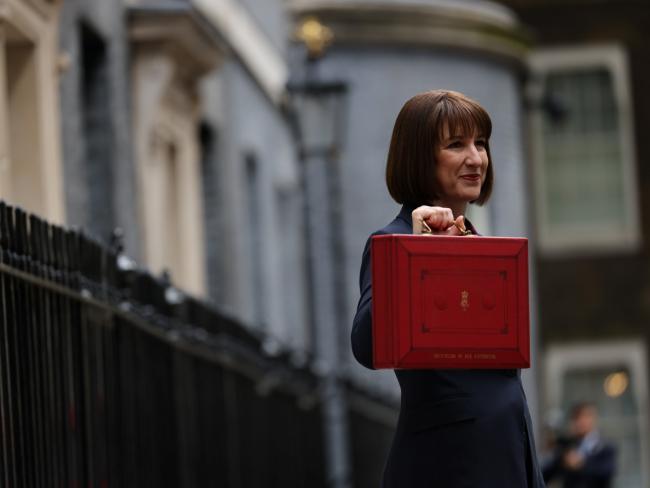
Tax should be raised for Britain’s urgent needs, not war. Chancellor Rachel Reeves on her way to deliver the Autumn Budget, 30 October 2024. Photo Lauren Hurley / DESNZ via Flickr (CC BY-NC-ND 2.0).
Taxes will rise in the Budget on 26 November – what’s the excuse? Tories, Reform, Brexit, lazy workers, low productivity. Never the EU, never devolution, never net zero policy, never lack of investment, never the debt to financial markets and interest paid. Never capitalism.
Debt, borrowing from financial markets, is a critical factor for any government.
But there are plenty of signs that another financial “correction” (that is, crash or recession) isn’t far off. The sharply rising valuation of AI companies, lauded by the government as the engine of future growth, can’t continue.
As is the capitalist way, plenty will go bust as the bubble bursts.
The financial markets are nervy; bond rates are going up and down. One day it’s all doom and gloom, the Chancellor’s budgetary headroom is all gone. The next day inflation isn’t quite as high as the market expected (though still nearly twice the Bank of England target), all is sunshine and Rachel Reeves says everything is going to plan.
‘The big catch is that this government, acting for the capitalist ruling class, wants to re-arm, to increase military spending. Its problem is to re-arm without raising taxes – or at least not be seen to do so…’
The big catch is that this government, acting for the capitalist ruling class, wants to re-arm, to increase military spending. Starmer hardly talks about anything else, it seems.
Its problem is to re-arm without raising taxes – or at least not be seen to do so.
The choices being made by this government seem, barely credibly, to be worse than their incompetent predecessors. Let’s cede back to the EU the (limited) independence we gained by leaving, in return for – nothing. The youth mobility scheme where the EU dictated the terms won’t help British youth.
And at the same time, let’s cosy up to the USA and watch the continued exodus of highly valued companies to US control, followed by the loss of skill and jobs. In return for – nothing, again. Except a seat at the warmongers’ table.
Workers need to be clear when thinking about the capitalist economy – of Britain and elsewhere. The Thatcherite free market experiment begun in the 1970s has totally failed. The idea was to reduce state control and release the fetters on the capitalists’ ability to make profits.
Market freedom ramped up the domination of finance capital over industrial capital. The drive to make profits found its outlet in buying and selling companies, and ever more exotic and risky financial deals.
The financial crisis of 2007-2008 created the capitalist need for quantitative easing (that is, printing money). That fuelled inflation – a way of cutting the share workers get of the value their work creates.
The capitalist failure to invest, and the extraction of value from British companies paying dividends to overseas owners, has led not only to inflation, but it has also been used to boost immigration.
If they are honest, workers know that change and rebuilding is needed in Britain – a tremendous amount. And who is going to sort out the mess? Leave it to Labour is not going well, predictably. Given that the problems are endemic to capitalism, would any other government in Westminster do any better?
Is there any alternative in the long term to the takeover of power by the workers of Britain – the means of production, distribution and exchange? How else could we liberate the potential of our working class, which is shackled by finance capital?
That’s a daring idea, and there are naturally many questions that need answering about how to build and maintain such a movement. But would we not be better off doing that than standing by watching preparations for war?
